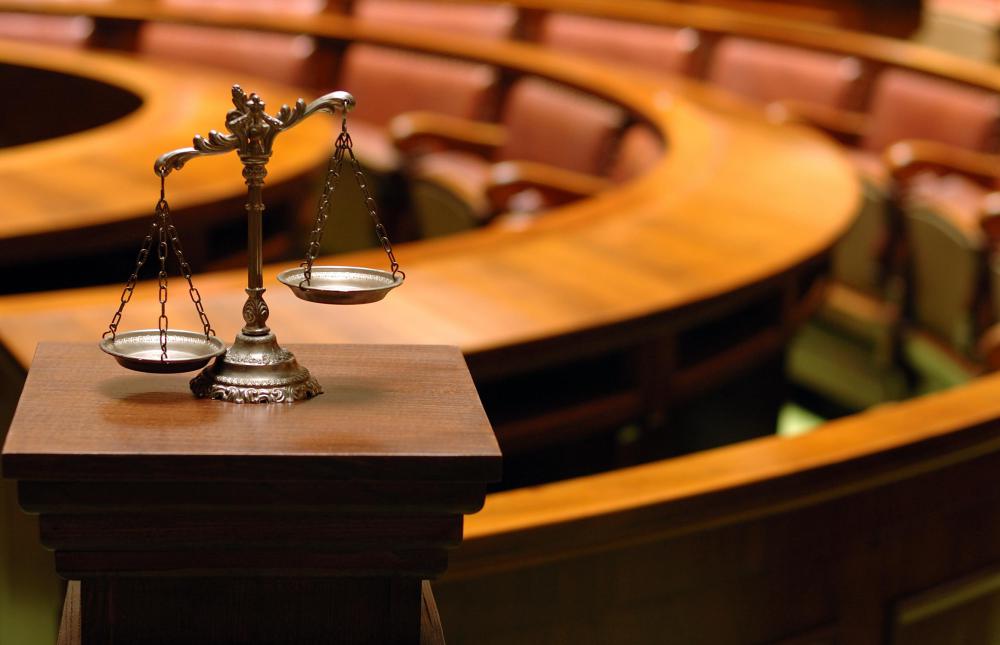At WiseGEEK, we're committed to delivering accurate, trustworthy information. Our expert-authored content is rigorously fact-checked and sourced from credible authorities. Discover how we uphold the highest standards in providing you with reliable knowledge.
What is the Jury Selection Process?
In the United States, defendants in criminal or civil issues appearing before a court have the right to be tried by a jury of their peers. A number of other countries also have laws in place which rely on juries to render a verdict. The jury selection process refers to the various methods used to determine which individuals will be required to serve.
Often, the first step in the jury selection process is to compile a randomly generated list of individuals eligible to serve. In the United States, eligible individuals are citizens who are at least 18 years of age. These individuals must also live in the local county in which they have been asked to serve. To gather an accurate sampling of the local community, this list is usually compiled through drivers' license and voter registration records.

Once the list has been completed, a jury summons form is mailed out to all prospective candidates — informing them of the specified time, date and location on which to appear. In many jurisdictions, the summons also includes a jury questionnaire section. These questionnaires gather personal data including education, marital status and occupation.
A number of prospective jurors will not make it to final jury selection process. Directions on the jury summons form typically cover allowed exemptions and disqualifications. For instance, individuals who cannot read are usually disqualified. Reasonable exemptions from serving on a jury might include being over 70 years of age or being a full-time student. Some individuals might also be able to request a delay due to prior appointments. Once prospective jurors return their jury summons form and show up for the appointed court date, the selection process can begin.

To assign jurors to particular cases, groups of jurors are taken into the courtroom and given background information on the case. In most instances, jurors must also swear to answer all questioned truthfully; then the questioning process known as voir dire begins. In England and Wales, this jury selection process is simple; the first 12 potential jurors are called and asked if they can give a fair hearing. Those that affirm they can are usually accepted.

In the United States, however, voir dire is a formal questioning process that allows the judge and lawyers on both sides to ask potential jurors a number of questions to determine eligibility. The returned jury questionnaires are shared with the lawyers and often influence the questions they ask. Generally, these questions are used to gain an understanding of a juror's background and determine if there are any prejudices that would prevent a juror from being impartial. For example, in a malpractice case a doctor who has previously been sued for malpractice might be excused from serving to avert the possibility of bias.

During the jury selection process, lawyers on both sides may excuse jurors by issuing a challenge — with or without cause. Challenges for cause can be issued when jurors have a bias toward one party. Lawyers on each side have an unlimited number of such challenges to issue. A peremptory challenge on the other hand is issued without reason. Unlike for cause challenges, each side has just a few that can be issued. Lawyers may strategically use these challenges in an attempt to influence the final jury make up in favor of their client.

The voir dire process continues until both sides are satisfied with the final jury pool. The size of the final jury differs somewhat based on the jurisdiction and the type of case being tried. In the United States, England and Wales, 12 member juries are common.
Although some jurors may resent having to serve and seek to avoid jury duty, the jury selection process is a vital part of the legal process. This random selection method ensures that race, gender, religion or other prejudices do not influence jury selection and helps all accused individuals get a fair trail.
AS FEATURED ON:
AS FEATURED ON:
















Discussion Comments
Knock on wood, I've never been called to jury duty my entire adult life. My wife has been called at least four times. She only had to sit on one jury, however, and that was for a fairly minor case. She said the jury selection process went pretty much like this article said it would.
She said the first time she was in the jury pool, they all got a summons to appear in a county courthouse at 9am on a Monday. The judge came in and just sent a bunch of them home without saying much at all. My wife didn't get cut at that time, so she got called into a small room for the voire dire part. Apparently the defendant was a nurse, and my wife worked at a local hospital. The prosecutor was concerned that she might have too much sympathy to be truly objective. They let her go.
This article was very useful to me, since I just received a letter from the federal court judge's office containing one of those jury questionnaires. I think it's only the first step in the jury selection process, since it didn't have a specific date or time on it. As far as I can tell, I'm just part of the jury pool right now.
It wouldn't bother me at all to serve on a jury. The courthouse is only a few miles from my house, anyway. I'd be interested in finding out how far along the jury duty selection process I'd actually get. I like to think I could be objective, but I also hold some strong opinions on things like the death penalty and drug abuse. If a lawyer asks me how I feel, I'm just going to tell him the honest truth.
Post your comments